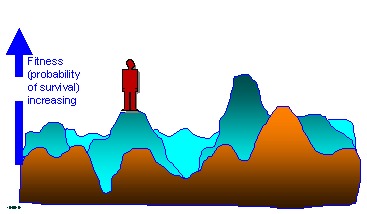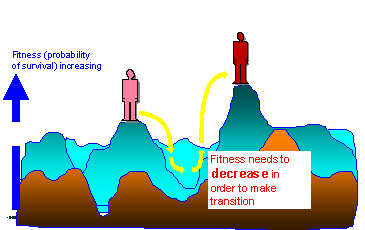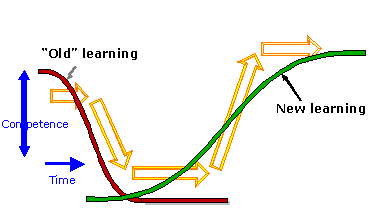Learning as Loss: 1
James S Atherton
Abstract
This paper sets out to explore some of the issues in the description and management of "supplantive" learning, which is the term adopted to describe learning which does not simply involve the addition of new knowledge, skills or attitudes to an existing stock ("additive" learning), but their replacement. It is thus a process of personal change which entails a substantial amount of un-learning and hence - it will be argued - of loss.
Notes, glossary and references are here
Latest! One of the most interesting new developments in the study of learning is the theory of "threshold concepts and troublesome knowledge". There are clear areas of overlap with the material in this paper. See the notes for more.
Failure to learn
Generally speaking, when people fail to learn something which they have been taught, the failure is attributed to one or more of three factors:
- lack of motivation
- lack of ability or aptitude
- poor teaching.
Experience with adults undertaking in-service courses of various kinds, however, suggests a fourth factor which is often neglected:
- the cost of learning.
By "cost" is implied the loss involved for the (superficially) competent and experienced adult in "changing their ways". Hitherto this person has been getting along quite nicely, thank you, with tried and familiar forms of practice and beliefs, until someone comes along and tells them that what they have been doing and believing is all wrong. It is not surprising if their initial inclination is to reject the new material and to carry on in the way in which they have been going.
This situation of course raises a further issue:
- They may be right to reject the new material: just because someone sets out to teach it does not mean that it is necessarily an improvement on what people already know and do.
The remarks which follow, therefore, are addressed principally to the situation where learners do attempt to change.
To follow the argument more clearly, it may be useful to relate it to some aspect of supplantive learning which you have experienced. This does not have to be particularly dramatic: efforts to change from two-fingered typing to touch-typing, improve a golf swing or a tennis service, or not to cross hands on the steering wheel will serve just as well as more "profound" learning.
A Model of the Learner
It is useful at this stage to dwell for a moment on the nature of an individual's attachment to their existing learning.
Implicit in the present discussion is a model of the learner as a survivor. This may appear to be too banal an assumption even to record, but it does have a number of implications.
- First, it focuses on the utility of the learning for the individual. People learn best what appears to them to be useful, either for intrinsic or extrinsic reasons.
- Second, it opens up the possibility of drawing on the theory of survival - evolution theory - to locate experience in its context.
Dawkins (1976) and Dennett (1993) suggest that the parallel between evolution in the biological world and learning in the psychological world is exact. Dawkins postulates the "meme" as the cultural counterpart of the gene for this purposes, and Dennett sums up a consequence of this view in the axiom that:
(Dennett, 1993:204)
(But you do not have to believe this to make sense of the rest of this argument)

Fig 1: Fitness Landscape
One particularly useful aspect of evolution theory for the present study is found in the idea of the "fitness landscape". This model was proposed initially by Seymour Wright in the 1930's and has been adopted by theorists of complex adaptive systems (Waldrop, 1992; Lewin, 1993; Gell-Mann, 1994; Kauffman, 1995). It is intended as a representation of the position of competing species within an eco-system, in which the relative degree of fitness of each is represented by the height of a peak above the surrounding plain. Gell-Mann literally inverts the model and represents increasing fitness in a downward direction, which may be counter-intuitive but is more appropriate for the present discussion. In this view, species rest in shallower or deeper "holes" in the landscape according to their fitness, or probability of survival. Accepting the convention of gravity, this indicates clearly the difficulty of moving from one "hole" to another: you have to climb up (or become less fit) to get out of one hole to find another which represents greater fitness. Clearly this is not possible for species themselves, but it is potentially possible in the world of psychological evolution or learning. I have chosen to refer to the state of being in a shallow hole as aporia, adopting the literary term for a "dead end".
One is reminded of the old First World War Bairnsfather "Old Bill" cartoon, with its famous line, "If you know a better 'ole, go to it!"

Fig 2: The impossible journey across the fitness landscape
Assuming, then, that one is not just rolling around on the landscape, but in the interests of survival has rolled into an aporia, what does "fitness" mean in the case of learned behaviour?
Becker (1970) characterised "committed change" (as opposed to mere "situational adjustment") as entailing "side-bets". By this he meant that committed change has secondary consequences, which lock the individual into the ensuing pattern of conduct. Thus a belief or feeling attains greater potency and significance when one acts upon it - when you "put your money where your mouth is". One much-studied psychological phenomenon which relates directly to supplantive learning is cognitive dissonance: in Festinger's original (1957) study, he supported the above argument with his finding that those people who had committed themselves most to the cult which he was studying, by selling their houses to raise money for the cause or giving up their jobs to work for it, for example, had the greatest difficulty in accepting that the cult's prophecies had failed to come true.
Fitness has to be seen within a context. Each fitness landscape is unique, and the fitness of a species is always relative to the landscape: powerful as it is, a polar bear would rate very low on fitness in a rain-forest. The same might be said of learning. The utility of any learning to a particular individual will depend on their personal world or life-space. Detailed knowledge of that world might theoretically enable one to predict which areas of supplantive learning may be problematic or, in my earlier formulation, "traumatic" for that individual, but only with difficulty (Atherton, 1986b, 1991). Problematic supplantive learning is likely to have affected - and to continue to affect - all of us at some time or another, and the evidence of the empirical research suggested that it was quite likely to affect between a quarter and a third of an in-service class at any one time. The level and significance of the problems can of course vary enormously, and there are some areas of teaching which are much more likely to encounter it than others, especially those known common-sensically as "sensitive" areas, involving perhaps race, sex, or politics.
This might suggest that people of a more rigid nature, typified as authoritarian or dogmatic (Rokeach, 1967) or simply as "rigid" in the popular literature (Skynner and Cleese, 1993) do indeed find it more difficult to change and are therefore likely to be challenged more by supplantive learning. This does seem intuitively to be the case, although Rokeach (1973) suggests that it is not so. It has also been suggested that there might be some association with Witkin's categories of "field-dependent" and "field-independent" learners (1977), but it has not yet been possible to operationalise the idea sufficiently to test this. Furthermore, the search for personality or learning-style variables to account for the incidence of problems in supplantive learning may well be misleading: if the fitness analogy is accepted, problematic supplantive learning is a systemic issue rather than an individual one.
Problematic supplantive learning seems most likely to occur when there is a considerable emotional investment in the "old" learning, usually related to:
- Personal history: change will involve the re-casting of prior experience - "You mean I've being doing it wrong all these years?" and/or
- Self-concept: which is often almost the same thing - "I've always thought of myself as a good teacher": and/or
- Present relationships and perhaps status: where a pattern of existing relationships is predicated upon a certain style of behaviour associated with old learning - a previously autocratic manager adopting a more democratic style of leadership.

Fig 3: Constraints on personal change
In other words, it is often not the learning itself which is the problem, so much as its implications. One consequence of this is that the learner's orientation towards the learned material becomes a relevant consideration. As long as the material is treated "academically" - at a distance, or en soi - it may pose no threat: the problem comes when the learner engages with it and is expected or attempts to make some commitment to it, to treat it pour soi. Thus it is perfectly possible for people to display vast amounts of knowledge, for example, about a topic which is total anathema to them, without experiencing any sense of conflict as long as the material remains "sealed off" in an academic pigeon-hole. Clearly, this is much easier in some subjects than others, and particularly difficult in prescriptive areas, such as professional or political theory.
A second corollary is that the implications are not always apparent at the time of learning, so that the problematic supplantive dimension "creeps up" on the learner as she or he attempts to put the learning into practice at a later stage, perhaps after the conclusion of the course or training programme. This not only removes many potential subjects from easy accessibility for research purposes, but casts doubt on some course evaluation exercises.
From the research point of view, problematic supplantive learning is not something most potential subjects are aware of: it is an outsider's perspective, so it is difficult to ask people directly about it. Moreover, there is a tendency for subjects acquainted with the idea to regard it as a fault in themselves, that they have been unable to learn something. They therefore tend to seek alternative accounts, of which the most common appear to be:
- blaming the teaching programme for failure on practically any count, and/or
- blaming the workplace or other practice setting for not offering "space" to change.
In the latter case, the plea may be that their work is constrained by set policies and procedures which allow no scope for change, or - more interesting - is under such pressure that there is no alternative to their present practice. This second account comes closest to a recognition of the "costing" of change.
Clearly, one likely outcome of all this is that potential learners will not learn. They may be quite clear about this, in that they may reject the content of the course or drop out; or they may conceal it through situational adjustment - if for example they have an instrumental motivation for attending the course. Assuming that one can be assured that failure to learn is not a consequence of one of the traditional reasons cited at the beginning of this paper, problematic supplantive learning can be recognised in part by the stage in the learning process at which it occurs.
Supplantive learning
Supplantive learning in its most general and weakest sense entails a degree of loss of competence, and perhaps of confidence, because a previous skill (or item of knowledge) has to be abandoned or rejected, while the learner is still on the learning curve with the new understanding or skill. Represented graphically, the curve of the old skill and that of the new produce a "learning trough". Frustration at this loss of competence can itself be sufficient to abort the learning process.

Fig 4: Simple supplantive learning
However, in problematic supplantive learning, the losses associated with personal change as noted above are superimposed on the original loss, and the two are likely to amplify each other: this makes it even more likely - although not inevitable - that the learning will be rejected.
The sequence of this process can be represented as a three-stage model, reproducing similar stages to those found in other models of personal change.
< 1 2 3 Notes Case-study>
Atherton J S (2013) Doceo; [On-line: UK] retrieved from
Original
material by James Atherton: last up-dated overall 10 February 2013 
This work is licensed under a Creative Commons Attribution-Noncommercial-No Derivative Works 3.0 Unported License.
Search Doceo and associated sites:
![]() Save this on Delicious Tweet
Save this on Delicious Tweet
 Click
here to send to a friend
Click
here to send to a friend
This site is independent and self-funded. The site does not accept advertising or sponsorship (apart from what I am lumbered with on the reports from the site Search facility above), and invitations/proposals/demands will be ignored, as will SEO spam. I am not responsible for the content of any external links; any endorsement is on the basis only of my quixotic judgement. Suggestions for new pages and corrections of errors or reasonable disagreements are of course always welcome.
